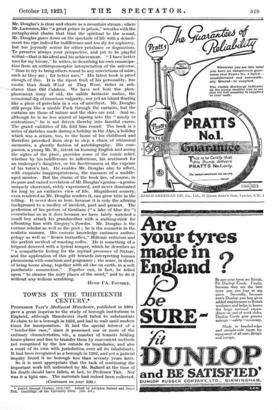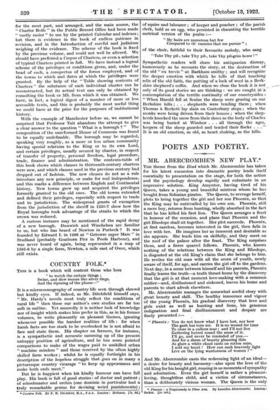TOWNS IN THE THIRTEENTH CENTURY.*
PROFESSOR TAIT'S Mediaeval Manchester, published in 1904 gave a great impetus to the study of borough institutions in England, although Manchester itself failed to substantiate its claim to be a borough in 1859, and had to wait until modern times for incorporation. It had the special interest of a "border-line case," since it possessed one or more of the ordinary characteristics, viz., a number of tenants holding house-places and free to transfer them by convenient methods not recognized by the law outside its boundaries, and also a court of its own with jurisdiction over all its inhabitants. It had been recognized as a borough in 1282, and yet a judicial inquiry found it no borough less than seventy years later.
So it is most appropriate that the task of continuing the important work left unfinished by Mr. Ballard at the time of his death should have fallen, at last, to Professor Tait. Nor was it a light one. The materials had indeed been collected,
(Continued on page 520.) • Britizh Borough Charters, 1216-1307. Edited by Adolphus Ballard and James Tait. Cambridge : at the Univeraity Press. 142s. netj
for the most part, and arranged, and the main source, the "Charter Rolls" in the Public Record Office had been made "vastly easier" to use by the printed Calendar and indexes ; but there is evidence in the book of endless patience in revision, and in the Introduction of careful and judicious weighing of the evidence. The scheme of the book is fixed by the previous volume, and could not well be altered. We should have preferred a Corpus of Charters, or even a selection of typical Charters printed in full. We have instead a logical scheme of the privileges or conditions given, and, under the head of each, a conspectus of the forms employed, and of the towns to which and dates at which the privileges were granted. By the help of the "Table showing contents of Charters" the substance of each Individual charter can be reconstructed, but its actual text can only be obtained by consulting the book or MS. from which it was obtained. We have, in fact, a logical digest of a number of more or less accessible texts, and this is probably the most useful thing we could have at the price for the purposes of institutional history.
With the example of Manchester before us, we cannot be surprised that Professor Tait abandons the attempt to give a clear answer to the question "What is a borough ? " The composition of the unreformed House of Commons was found to be equally undefinable. The borough may be regarded, speaking very roughly, as a more or less urban community having special relations to the King or to its own Lord, and certain privileges, usually secured by charter, in respect of transfer of property, personal freedom, legal procedure, trade, finance and administration. The contents-table of this book shows which clauses in thirteenth-century charters were new, and which clauses used in the previous century had dropped out of fashion. The new clauses do not as a rule introduce any new principle, or make for real independence, and this marks a difference between English and Continental history. New towns grew up and acquired the privileges formerly granted to the old ones. The old towns extended and defined their privileges, especially with respect to trade and to jurisdiction. The widespread grants of exemption from the jurisdiction of the sheriff in 1250-7 show how the Royal boroughs took advantage of the straits to which the crown was reduced.
A curious instance may be mentioned of the rapid decay of a new borough. Dunwich and Winchelsea are familiar to us, but who has heard of Newton in Purbeck? It was founded by Edward I. in 1286 at " Gotowre super Mare" in Studland (probably Goathorn Pier in Poole Harbour), and was never heard of again, being represented in a map of 1585-6 by a single farm, Newton, a mile east of Ower, which still exists.



























































 Previous page
Previous page